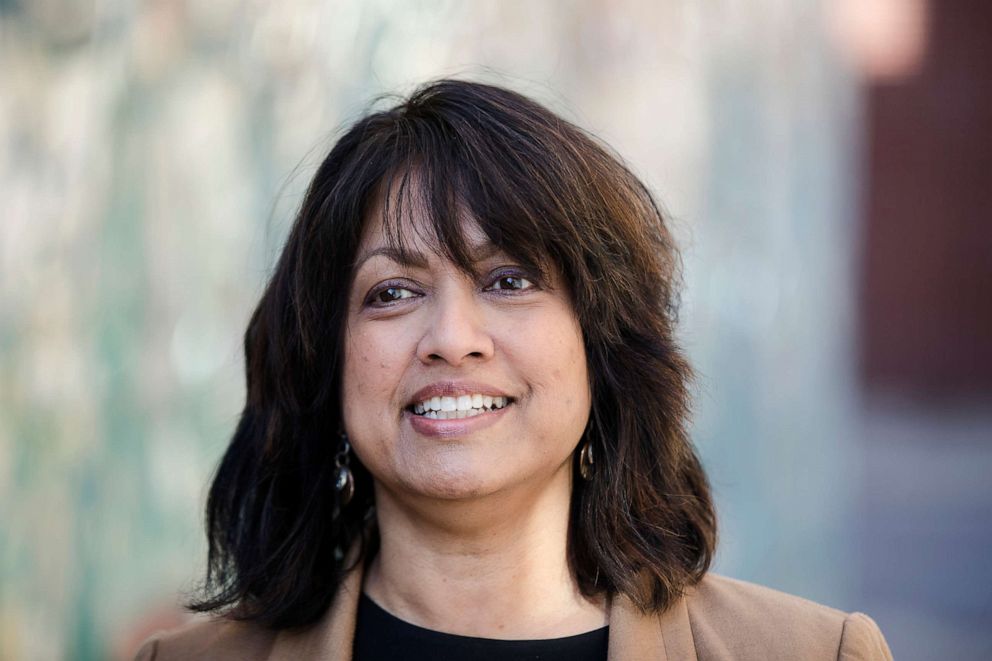这份报告是美国广播公司新闻长达一个月的开创性系列节目“转折点”的一部分,该节目审查了席卷美国的种族清算,并探讨了它是否能导致持久的和解。
如同宾夕法尼亚州民主党人的目标是在11月份将重点州翻回蓝色,该州的政治领导人正在他们的政党内就政治和代表性采取历史性的行动。
距离大选还有两个月,在全国对种族和正在进行的选举进行清算的背景下,宾夕法尼亚州发现自己越来越多地成为2020年竞选的焦点冠状病毒大流行。此外,随着两次总统竞选都在为最后一击做准备,该州作为关键总统战场的声誉让一些宾夕法尼亚州民主党人希望看到他们州向多元化的转变反映在国家政治格局中。
其中包括宾夕法尼亚州众议员马尔科姆·肯雅塔(Malcolm Kenyatta),他作为一群年轻的民主党全国代表大会主旨发言人之一,在国家舞台上留下了自己的印记,该党将其视为“来自下一代政党领导人的不同声音”。

安德鲁·哈尔尼克/美联社
2020年1月8日,在爱荷华州得梅因市得梅因南区办公室,宾夕法尼亚州众议员马尔科姆·肯雅塔(Malcolm Kenyatta)在支持民主党总统候选人前副总统乔·拜登的竞选活动中发表讲话。
对于肯雅塔这样的新兴政治领导人来说,30岁是唯一的同性恋黑人当选为州立法机构成员,他认为这应该是正常的,而不是不寻常的。肯雅塔代表位于费城县的该州第181区,他说这些差异只会给他更多的意志力来打破可能会出现的“不同”。
肯雅塔在接受美国广播公司新闻采访时说:“我曾经相信,当我决定竞选的时候,我有一个完整的清单,上面列出了所有这些不同的原因,为什么我觉得,你知道,也许我不是合适的人。”"但我现在看起来,所有我认为不符合我条件的东西实际上都符合我的条件."
肯雅塔并不是唯一一个动摇宾夕法尼亚州政治前景预期的人。尼基尔·萨瓦尔(Nikil Saval)是费城第一位当选民主党选区领导人的亚裔美国人,他已经创造了宾夕法尼亚州的历史,现在正在竞选该州第一参议院选区的代表。
即将进入11月的萨瓦尔将是第一个当选宾夕法尼亚州参议院的亚裔美国人,也是第一个当选该州立法机构的印第安人。对萨瓦尔来说,他在该州选民中看到的变化可能预示着更大的代际变化。
萨瓦尔在接受美国广播公司新闻采访时说:“我认为,我这一代和更年轻的人经历了,你知道,现在两次主要的衰退,一种无休止的战争,只是像往常一样对政治感到非常沮丧。”
肯雅塔附和了这一观点,他说,他认为他所代表的选民的沮丧反映了整个州不断发展的政治气候。这种演变也可能影响宾夕法尼亚州未来的政策变化,在这个选举周期中,选民在政府中的代表性越来越大。
肯雅塔说:“我认为最接近痛苦的人应该是最接近权力的人。”。“我从各种不同的角度看待问题,这很自然。我认为这会让你成为一名更好的立法者,因为你对我们所做的决定如何影响不同的群体更加敏感...那些一开始就不在政策提议的谈话中心的群体——因为这就是你最终拥有的。”
萨瓦尔得到了伯尼·桑德斯的支持,并把关注宾夕法尼亚州的工人阶级作为优先事项,他补充说,看到代际政治的转变已经在民主党人中间进入了全国政治舞台。
“人们似乎愿意寻找更尖锐、更多样的声音,”他说。“你在全国范围内看到了这一点。很明显,当你开始看到像伊尔汉·奥马尔或亚历山大·奥卡西奥-科尔特斯这样的人物赢得全国大选时,我受到了启发。这是我们的联邦级选举——你突然觉得有一个地方可以让你真正进入,直截了当地说出你的想法。”
在宾夕法尼亚州审计长的竞选中,全州的代表性也很明显,两位候选人都是有色人种——这意味着无论结果如何,宾夕法尼亚人都将首次选举一位具有不同种族背景的候选人担任该州的最高法律和财务主管。

尼基尔·萨瓦尔为州参议员
尼基尔·萨瓦尔在他的网站上为宾夕法尼亚州的州参议院拍摄了一张照片。
候选人包括民主党人尼娜·艾哈迈德和共和党人蒂姆·迪福。艾哈迈德21岁时作为学生从孟加拉国来到美国,迪福尔是非洲裔美国人,目前是多芬县的县长。
到达美国后,艾哈迈德在宾夕法尼亚大学注册,并在成为分子生物学家之前获得了化学博士学位。如果当选,艾哈迈德将是第一位在全州范围内担任行政职务的女性,也是基石州行政部门中唯一的女性和有色人种。
“我有时候会掐自己,你知道吗?”艾哈迈德在接受美国广播公司新闻采访时说。“我正在竞选全州的公职,我获得了551,144张选票...在六人赛中。我时不时地对“我是怎么到这里的?”感到非常惊喜"
“我是来自孟加拉国的移民,我经历了非常残酷和血腥的独立战争。所以,我看到人们为了自由牺牲了什么,”她说。“20万名妇女和女孩被残酷对待,你知道吗?我不想使用触发词,但他们这样做是作为一种战争工具。这让我为公平竞争而奋斗,不仅仅是为了女性,也是为了边缘群体,因为我知道成为这种竞争的接受者意味着什么。”
艾哈迈德说,她认为人们正在以前所未有的方式谈论种族问题,因为宾夕法尼亚州的社区正在奋起直追种族关系的原因。艾哈迈德仍然希望这些变化将继续下去,并在州一级和国家一级扩大到有意义的变化和包容性。
她说:“我们在所有67个县的任何地方都有深切关心人权的人,但有时他们没有足够的人数,或者,你知道,没有足够的勇气说出这一点。”
艾哈迈德说:“我非常感谢我所站在其上的所有人,感谢我为他们做出的牺牲。”。“这就像我每次说的提醒自己的小祷告:我不是一个人来到这里的,是很多人的辛勤劳动和血汗泪水让我今天来到这里。所以,我很有希望,我要为那个梦想而奋斗。”
尽管许多民主党人感到该州一些地方发生的变化赋予了他们权力,但宾夕法尼亚州作为一个战场的政治影响力笼罩着该党在2020年组织全州竞选的方式。四年前,唐纳德·特朗普(Donald Trump)总统仅以0.7%的选票赢得了Keystone State,今年,一场激烈的竞争可能会再次发生,因为最近的民调显示,特朗普和他的对手乔·拜登(Joe Biden)的立足点都不稳固。
根据昆尼皮亚克大学最近的一项民意调查,拜登在宾夕法尼亚州领先8个百分点,为52%,特朗普为44%。与此同时,蒙莫斯大学的一项民意调查显示,两人之间的竞争更加激烈,拜登在宾夕法尼亚州的注册选民中领先特朗普4个百分点:49%对45%。
“我认为整个州的情况都在发生变化,”萨瓦尔说。“也可能是两极分化,和...可能有人在画线。我的意思是,事情在某些方面也可能变得更加保守。很明显,右翼正在激进化。”
根据美国进步中心(American Center for Progress)对2016年总统选举的分析,宾夕法尼亚州的大多数选民是白人,但这些选民中有更大一部分,即54%,没有受过大学教育,而30%拥有大学学位。这个无党派组织的数据还显示,在该州的少数民族选民中,大约10%是黑人,4%是拉丁裔,3%是亚裔或其他种族。

马特·洛克/美联社
2018年1月31日,前市政官员尼娜·艾哈迈德(Nina Ahmad)在费城与媒体成员交谈,她试图赢得民主党对美国众议员鲍勃·布雷迪(Bob Brady)席位的提名。
尽管美国进步中心指出,与2012年相比,2016年黑人选民的投票率下降了0.2%,但其他少数群体的投票率上升了。拉丁裔选民上升了6个百分点,而亚洲和其他少数民族选民上升了8个百分点。
尽管总统候选人仍必须专注于赢得白人、非大学学历的选民,除了在费城和匹兹堡等高度多样化的城市地区扩大投票,但在拉丁美洲人口较多的地方,如雷丁、艾伦镇、哈兹顿、兰卡斯特和黎巴嫩,少数民族投票模式的上升可能会发挥很大作用。
肯雅塔说,他希望政治的多样性能够延伸到显示教育背景和职业的包容性。他说这些变化不应该仅仅发生在2020年选举但是对于未来的所有选举。
肯雅塔说:“我的希望不是人们仰望我,而是他们照镜子时不会说,‘哦,我的上帝,看看马尔科姆做了什么’,而是说,‘哦,我的上帝,看看我能做什么。’”。“因为当一个年轻的拉丁裔人、同性恋者、双性恋者、跨性别者或在贫困中长大的人最终竞选公职时,我们必须去一个不再是主要新闻的地方。我们需要去一个不再是新闻,而是常态的地方。”
肯雅塔说,像他这样的当选官员给这个战场州的政治未来带来了希望和变化:他希望所有居民都能以积极的方式看待这一点,以便真正有所作为。
“但是能见度确实很重要,因为人们很难成为他们看不见的人,”他说。"但是一旦人们看到我,我给他们的信息总是看到你自己."
Democrats in Pennsylvania hope to see diversity reflected in 2020 election
This report is part of "Turning Point," a groundbreaking month-long series by ABC News examining the racial reckoning sweeping the United States and exploring whether it can lead to lasting reconciliation.
AsPennsylvaniaDemocrats aim to flip the Keystone State back to blue come November, the state's political leaders are making historic moves within their party in terms of politics and representation.
With two months until the general election, Pennsylvania finds itself increasingly in the 2020 campaign spotlight against a backdrop of a national reckoning over race and the ongoingcoronavirus pandemic. And, as both presidential campaigns gear up for the final push, the state's reputation as a key presidential battleground has some Pennsylvania Democrats hoping to see their state's shift toward diversity reflected in the national political landscape.
Among them is Pennsylvania State Rep. Malcolm Kenyatta, who made his mark on the national stage as one of a group of young Democratic National Convention keynote speakers whom the party identified as "diverse voices from the next generation of party leaders."
Pennsylvania state House Rep. Malcolm Kenyatta, D-Philadelphia, speaks at a campaign stop to support Democratic presidential candidate former Vice President Joe Biden at the Biden for President Des Moines South Side Office, Jan. 8, 2020, in Des Moines, Iowa.
For emerging political leaders like Kenyatta, being 30 years old and the only gay, Black man elected to the state legislature is something he feels should be normalized rather than seen as unusual. Kenyatta, who represents the state's 181st District, located in Philadelphia County, says these differences only give him more willpower to break what may come across as "different."
"I used to believe, when I decided to run, I had this whole list of all these different reasons why I felt like, you know, maybe I wasn't the right person," said Kenyatta in an interview with ABC News. "But I look now and everything that I thought disqualified me actually qualified me."
Kenyatta isn't the only one shaking expectations in Pennsylvania's political landscape -- Nikil Saval, who already made Pennsylvania history by being the first Asian American to be elected as a Democratic ward leader in Philadelphia, is now running to represent the state's First Senate District.
Saval, who is going into November unopposed, will be the first Asian American elected to the Pennsylvania Senate and the first Indian American elected to the state's legislature. For Saval, the shift he sees across the state's electorate could be indicative of a larger generational change.
"I think there's just a cause for people of my generation and younger who have been through, you know, now two major recessions, kind of endless war and just felt really frustrated by politics as usual," Saval said in an interview with ABC News.
Kenyatta echoed that sentiment, saying that he sees the frustrations of voters he represents as a reflection of the developing political climate across the state. That evolution could also affect future policy change across Pennsylvania, where voters in this election cycle are seeing more representation in their government.
"I think that people closest to the pain ought to be closest to the power," said Kenyatta. "I'm viewing issues from a variety of different perspectives, just naturally. And, I think it makes you a better legislator because you're more sensitive to how the decisions we make impact a variety of different groups... the groups who were not centered in the conversation as the policy was being proposed in the first place -- because that's what you end up having."
Saval, who was endorsed by Bernie Sanders, and has made it a priority to focus on Pennsylvania's working-class, added that seeing a shift in generational politics has already made its way to the national political stage among Democrats.
"There's like a willingness to seek out sharper voices, more diverse voices," he said. "You see this nationally. I was obviously inspired by the notion of when you start seeing figures like Ilhan Omar or Alexandria Ocasio-Cortez winning national elections. It's our federal level elections -- you suddenly feel like there's a place for you to actually enter [and] be forthright and speak your mind."
Statewide representation is also evident in the race for Pennsylvania's auditor general, in which both candidates are people of color -- meaning that no matter the outcome, Pennsylvanians will elect a candidate with a racially diverse background as the top legal and financial supervisor of the state for the first time.
Nikil Saval from a photo on his website for State Senate in Pennsylvania.
The candidates include Democrat Nina Ahmad and Republican Tim DeFoor. Ahmad came to the United States from Bangladesh as a student when she was 21 years old, and DeFoor, who is currently the Dauphin County controller, is of African American descent.
Upon arriving in the U.S., Ahmad enrolled at the University of Pennsylvania, and went on to earn a Ph.D. in chemistry before becoming a molecular biologist. If elected, Ahmad would be the first woman of color to serve in a statewide executive position, as well as the only woman and person of color in the Keystone State's executive branch.
"I pinch myself sometimes, you know?" Ahmad said in an interview with ABC News. "I'm running for statewide office, and I got 551,144 votes split... in a six-way race. I'm very pleasantly surprised from time to time as to 'how did I get here?'"
"I'm an immigrant from Bangladesh and I lived through the War of Independence, which was very brutal and very bloody. And so, I've seen what people sacrificed for freedom," she said. "200,000 women and girls were brutalized, you know? I don't want to use the trigger words, but they did that as a tool of war. That has made me fight to level the playing field, not just for women but for marginalized communities, because I know what it means to be on the receiving end of that."
Ahmad said she thinks people are having conversations about race in unprecedented ways because communities across Pennsylvania are rising up to address the cause of race relations head-on. Ahmad remains hopeful that those kinds of changes will continue and expand into meaningful change and inclusivity both on a state level and on a national level.
"We've always had people everywhere -- in all 67 counties -- who care deeply about human rights, but sometimes they haven't had enough numbers or, you know, felt courageous enough to speak up about it," she said.
"I owe a great debt of gratitude to all whose shoulders I stand on, all whose sacrifice I stand in," Ahmad said. "It's like my little prayer that I say every time to remind myself: I didn't get here by myself, it was a lot of people's hard work and blood, sweat and tears that allows me to be here today. So, I'm very hopeful, and I'm going to fight for that dream."
Though many Democrats feel empowered by the change seen across some parts of the state, the political weight of Pennsylvania as a battleground looms over how the party is organizing statewide campaigns in 2020. Four years ago, President Donald Trump won the Keystone State by just 0.7% of the vote, and this year, a tight race could take place again, as recent polls indicate shaky footing for both Trump, and his opponent, Joe Biden.
According to a recent Quinnipiac University poll, Biden has an eight-point lead in Pennsylvania, 52% to Trump's 44%. Meanwhile, a Monmouth University poll showed a tighter race between the two, with Biden leading Trump by four points among Pennsylvania's registered voters: 49% to 45%.
"I think things are changing across the state," Saval said. "It may also be polarizing, and... there may be people drawing lines. I mean, things may also be getting more conservative in certain ways. There's radicalization happening on the right, clearly."
According to an analysis of the 2016 presidential election conducted by the American Center for Progress, the majority of voters in Pennsylvania were white, but a larger portion of those voters, 54%, were non-college educated, while 30% had a college degree. The nonpartisan group's data also indicated that among the state's minority voters, about 10% were Black, 4% were Latino and 3% were Asian or of another race.
Nina Ahmad, a former city official seeking to win the Democratic nomination for U.S. Rep. Bob Brady's seat, speaks with members of the media in Philadelphia, Jan. 31, 2018.
While the American Center for Progress notes that turnout among Black voters decreased by 0.2% in 2016 when compared to 2012, the turnout for other minority groups rose.Latino votersrose by six points, while Asian and other minority voters went up eight points.
While presidential candidates must still focus on winning over white, non-college educated voters, in addition to expanding the vote in highly-diverse urban areas, like Philadelphia and Pittsburgh, the rising voting patterns among minorities are likely to play a large factor in places with high Latino populations, like Reading, Allentown, Hazleton, Lancaster and Lebanon.
Kenyatta said he hopes that diversity in politics extends to show the inclusivity of educational backgrounds and careers. He said these changes should happen not just in the scope of the2020 election, but for all elections going forward.
"My hope is not that people look up to me, but that they look in the mirror that they're not saying, 'Oh my God, look what Malcolm did,' but they're saying, 'Oh my God, look what I can do,'" said Kenyatta. "Because we have to get to a place where it's no longer major news when a young Latina, or LGBTQ person or somebody who grew up working poor finally runs for office. We need to get to a place where that's no longer news, [but] the norm."
Kenyatta said elected officials like himself give a sense of hope and change to the future of politics in the battleground state: something he wishes all residents could see in a positive way in order to truly make a difference.
"But the visibility does matter, because it's difficult for people to be what they can't see," he said. "But once people see me, my message always to them is to then see yourself."






